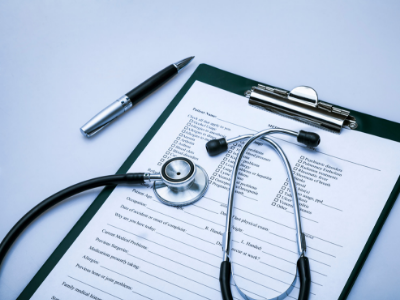 March is National Colon Cancer Awareness Month.
March is National Colon Cancer Awareness Month.
As the third most common cancer in the United States, it’s time we start talking about the signs and symptoms of colon cancer, and ways you can prevent yourself from becoming a statistic.
Colorectal cancer, or colon cancer, occurs in the colon or rectum. The colon is part of the large intestine or large bowel, and the rectum is the passageway that connects the colon to the anus. Most colon cancers develop first as polyps, which are abnormal growths inside the colon or rectum that may later become cancerous if they are not removed. If it is not diagnosed early, colon cancer can spread to nearby lymph nodes, or even to other major organs, such as the liver and lungs.

So, why is this month so important?
The best way to prevent colon cancer is by arming yourself with facts and information. This month is recognized so we can raise awareness about colon cancer and take action toward prevention. By educating yourself, you may be less likely to get colon cancer, and more likely to beat it if you have already been diagnosed.
Let’s start with the history of National Colon Cancer Awareness Month.
Colon cancer started making waves in the late 90s, dubbed “the silent killer” because there was such little conversation and education surrounding the deadly disease. In fact, awareness was so low that less than 50 percent of Americans were following screening guidelines.
In 2000, a coalition of 50 collaborating partners moved Congress to designate March as National Colon Cancer Awareness Month, and then President Bill Clinton signed a White House Proclamation officially designating the month. From there, education and prevention efforts took off.
It’s important to understand colon cancer risk factors.
Research shows that people with certain risk factors are more likely than others to develop colon cancer. There is no known exact cause of colon cancer, but it is important to pay close attention to factors that may increase your risk. These include:
- Age – More than 90 percent of people with colon cancer are diagnosed after the age of 50, and the average diagnosis age is 72.
- Family history and genetics – Your risk increases if you have a family history of polyps, and it increases significantly if you have first degree relatives (parents, brothers, sisters or children) who have had colon cancer. Genetic alterations, and specific inherited genes or conditions also contribute to developing colon cancer.
- Personal history – If you have already had colon cancer, you are at greater risk of developing the cancer a second time. Also, women with a history of ovarian, breast or uterine cancer are at a somewhat higher risk.
- Inflammatory diseases – Diseases and conditions that cause inflammation of the colon, such as ulcerative colitis or Crohn’s disease, may increase your risk of developing colon cancer.
- Diet and lifestyle – Inactivity, obesity and cigarette smoking have all been linked to higher risk of colon cancer.
There are signs and symptoms that you should look out for.
- A change in your bowel habits, including diarrhea or constipation, or a change in the consistency of your stool.
- Rectal bleeding or blood in your stool
- Persistent abdominal discomfort, such as cramps, gas or pain
- A feeling that your bowel doesn’t empty completely
- Weakness or fatigue
- Unexplained weight loss
Screenings are the most important part in combating colon cancer.
Doctors recommend certain screening tests for healthy people with no signs or symptoms in order to look for early colon cancer. People with an average risk of colon cancer should begin getting screenings at age 50. African Americans should begin screenings at age 45. But people with an increased risk, such as those with a family history of colon cancer, should consider screening sooner. Talk with your doctor about your options, and together you can decide what tests are best for you and your situation. If you are showing signs and symptoms of colon cancer, your doctor may recommend one or more tests and/or procedures, including:
- Colonoscopy. During this procedure, a long, flexible and slender tube attached to a video camera and monitor is used to view your entire colon and rectum. If any suspicious areas are found, your doctor can pass surgical tools through the tube to take tissue samples (biopsies) for analysis and remove polyps.
- Blood tests. No blood test can tell you if you have colon cancer. But your doctor may test your blood for clues about your overall health, such as kidney and liver function tests.
Early detection is vital for effective treatment and survival.
With early screenings, colon cancer can often be found early and treated most effectively. A screening can even prevent cancer by identifying polyps that may be cancerous, allowing doctors to remove them before cancer actually develops. If cancer is discovered during a screening, earlier detection mean a chance at a longer life. In fact, the five-year survival rate for colon cancer found at the local stage is 90 percent. In many cases, the five-year survival rates are lower when cancer is more advanced at detection.
Make an appointment with your doctor.
Together, you and your physician can discuss your risk factors and any symptoms you may be worried about. If you are diagnosed with colon cancer, your doctor will work with you to develop the best and most effective treatment plan.
Educate yourself and be your own health advocate.
Any kind of cancer is scary, and each kind should be taken seriously, which is why we should use National Colon Cancer Awareness Month to educate ourselves and others. Knowing your facts is the best way to combat cancer and advocate for your health.
Dr. Lynn M. O’Connor dedicates her practice to providing the foremost treatment, technology, and information related to preventive public health issues and colon and rectal health. An outstanding surgeon and health advocate, Dr. O’Connor is also the Director of the Women’s Colorectal Care Program for ProHEALTH Care Associates in the Greater New York City area. Click HERE to contact Dr. O’Connor’s office, or to schedule an appointment.
This blog provides general information and discussion about health, medicine, and related subjects. The content provided in this blog, and in any linked materials, are not intended and should not be construed as medical advice. If you have a medical concern, you should consult with a licensed physician or appropriate health care worker. If you think you may have a medical emergency, call your doctor immediately. The views expressed on this blog and website have no relation to those of any health care practice, hospital, or other institution with which the author is affiliated.




